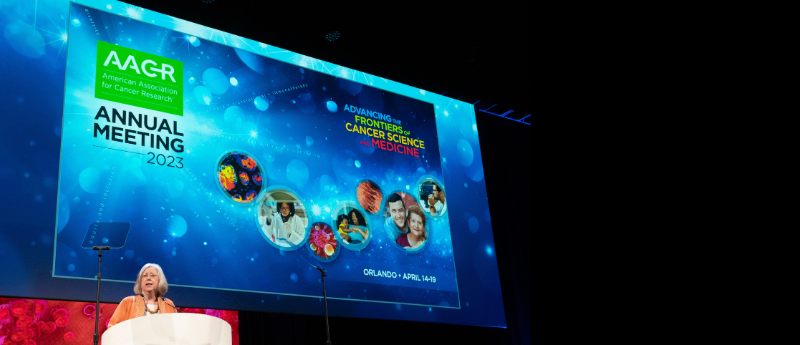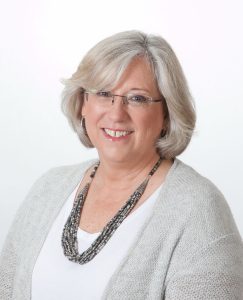Reviewing AACR 2023 with outgoing President Lisa Coussens

 This year’s meeting of the American Association for Cancer Research (AACR; 14 – 19 April 2023; Orlando, FL, USA) provided a fascinating insight into the latest basic, translational and clinical cancer research, with a leading theme Advancing the frontiers of cancer science and medicine.
This year’s meeting of the American Association for Cancer Research (AACR; 14 – 19 April 2023; Orlando, FL, USA) provided a fascinating insight into the latest basic, translational and clinical cancer research, with a leading theme Advancing the frontiers of cancer science and medicine.
Here, we speak to AACR Immediate Past-President Lisa Coussens (left; Oregon Health and Science University, OR, USA) about her highlights of the conference, the key takeaways from the event and her presidential legacy.
Of all the sessions at the event, what were you most proud of in this year’s program?
That’s a hard question. What we tried to achieve for the plenaries was to include a talk in each of the plenary sessions that would be loved by a different component of our membership. So some basic science, translational science, clinical science, population science and some epidemiology. I thought that the opening plenary, “Advancing the frontiers of cancer science and medicine,” absolutely rocked the house. Our charge to the opening plenary speakers was to inspire the audience, not to dive too deeply into their specific research, but to embrace and represent their fields and truly inspire, especially the young people. Each speaker was spectacular in this role. As the president of AACR, this was likely my favorite session.
Another highlight for me was the “Embracing immune ecosystems” plenary on Tuesday, which was remarkable. We hear so much about T cells and checkpoint inhibitors; however, the focus of my career has been striving to understand myeloid–T-cell communication networks. This session discussed myeloid cells, B cells, T cells and the clinical trials that are targeting each of these components of the immune system, and trying to understand the biomarkers that are elicited when you tweak one component. As a researcher and on a more personal level, this would be a top spot contender for me, so it’s a real tossup!
What are three key things that you would like this year’s attendees to take away from the AACR Annual Meeting 2023?
My three points all link together with the key theme of communication. First, cancer science and cancer medicine are at an important inflection point. We’re no longer siloed disciplines. If biology can’t embrace immunology, and vice versa, and all of the other components of tumor physiology and the microenvironment can’t embrace data science to come together to translate basic research findings into the clinic, then it is going to be a very slow road to patient impact.
So, second, we need communication between basic research and clinicians or clinical trialists, so that they can learn how to speak to the people that write and run clinical trials. Then we need communication with pharma, who takes clinical trials through to the patients, and ultimately communication with patients.
Then to be truly effective, we need to learn how to communicate with other disciplines, with people that speak different discipline-specific languages. You have to be able to communicate in order to collaborate. And it is no longer a game of single-grant funded investigators; it’s a game of multi-discipline, collaborative team science. Learning how to embrace that is key to success.
With your focus on communication and collaboration, do initiatives like the Cancer Grand Challenges, which stipulates multidisciplinary, multinational teams, encourage you?
Oh, absolutely. International Initiatives like Stand Up to Cancer and the collaboration between Cancer Research UK (London, UK) and the National Cancer Institute (MD, USA) to form Cancer Grand Challenges are truly promising. The whole notion of geographically unencumbered multi-team grants is the way science needs to be done. You know, North America doesn’t have ownership of great science, there’s great science all around the world. And it only makes sense to fund those teams to come together to achieve the ultimate goal of taking something into the clinic and benefiting patients.
What would you like your legacy as the AACR president to be?
That we are no longer siloed. And out of that, consensus that we have a tremendous responsibility to lift up the generations that come behind us and provide what is needed to even earlier learners, like high school students, to stay embedded in education, go to college, pursue scientific careers and serve society through science.
Our job is to inspire them to stay connected. When I met with the undergraduates and the high school students at the meeting, I told them their job was to leave with emails and phone numbers, because that network could become their colleagues for the rest of their careers. I also said that they needed to leave having learned two new things, so that they could go home and read about them and get excited. That’s the role of these societies. Our job is to inspire.
What can we expect from next year’s President, Phil Greenberg?
Phil has many of the same visions I have had. Funding the pipeline, keeping kids engaged and teaching scientists how to communicate. None of us are taught communication skills. We get our PhDs and complete our postdocs because we have good hands and we’re good thinkers, but we’re not necessarily trained, or even given experiences that enable us to learn how to communicate. And so I expect Phil to further our goals to fulfill education, communication, training and to encourage federal governments to fund big and expensive collaborative science.
Do you have any advice for an early career researcher starting out in cancer research today?
Don’t be afraid to reach out to someone and meet them and engage with them even if you don’t know who they are. If you’ve read their paper, go up to them and say, you know, I read your paper and it really got me excited, can we talk? That’s the only way to enhance your environment, to meet people and pull more people into your circle.